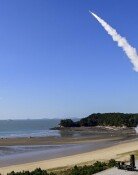President May Veto Police Bill
President May Veto Police Bill
Posted December. 26, 2005 03:12,
President Roh Moo-hyun is agonizing over whether to exercise his veto power on a bill which would enable rank-and-file police officers to be automatically promoted to lieutenant after working a given period of time.
The bill passed in a plenary session of the National Assembly on December 8 was scheduled to be discussed in a cabinet meeting and come into force on December 27. But it faces an opposition because some officials in the government and Cheong Wa Dae claim that this bill should be reconsidered on the basis of the treatment civic servants in other departments receive.
Some secretaries in Cheong Wa Dae are opposed and say that next year alone, an astronomical 39.5 billion won budget will have to be appropriated due to reductions in long-service promotions, and that the police bill is not fair because it doesnt apply to fire officers and correction officers, who have a similar promotion system, and to lower-level administrative civil servants.
The Ministry of Planning and Budget and the Ministry of Government Administration and Home Affairs (MOGAHA) have already expressed opposition to the bill, and Prime Minister Lee Hae-chan reported the problems to President Roh on December 19.
Meanwhile, a series of counterarguments are arising. No president in Korean history has ever exercised veto power on a non-political bill, and even there is a possibility that the presidents veto power could cause a rift between the ruling Uri Party and the government as the ruling party aggressively has pushed ahead with its bill.
As the Grand National Party and some religious leaders are clamoring for the president to veto the revised private school bill, Rohs veto powers could spawn another controversy.
Cheong Wa Dae spokesperson Kim Man-soo gave a briefing on December 25, saying, The president has not yet decided on what to do with his veto power. He will state his opinion by December 26.
President Roh vetoed the special anti-corruption bill against presidential associates in November, and the special bill on money remittance to North Korea in July 2003.
In March of last year, then-acting President Goh Kun remitted special bills to the National Assembly, including revised pardon bills and the Geochang Civilian Massacre, both of which were aimed to at restoring honor to people and compensating them.
Yeon-Wook Jung jyw11@donga.com







